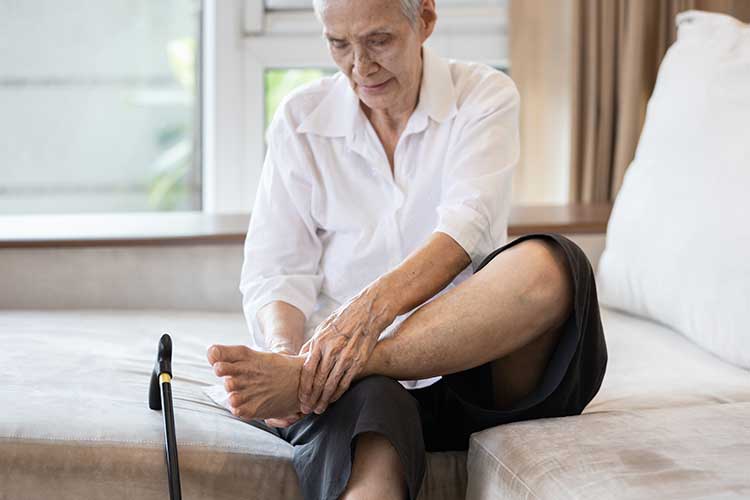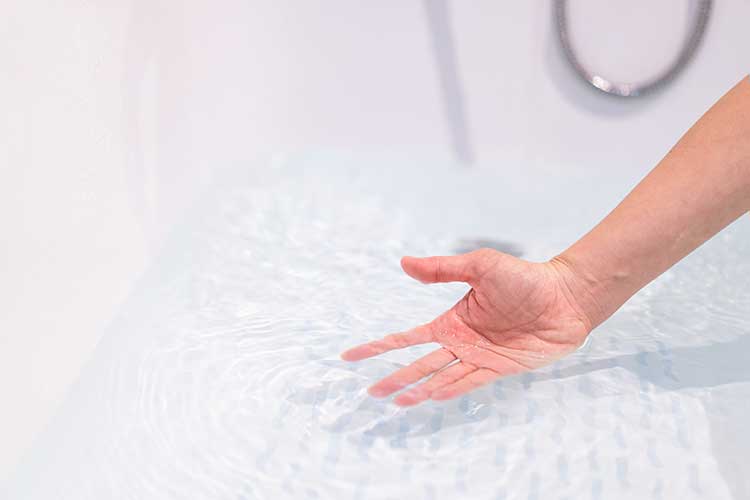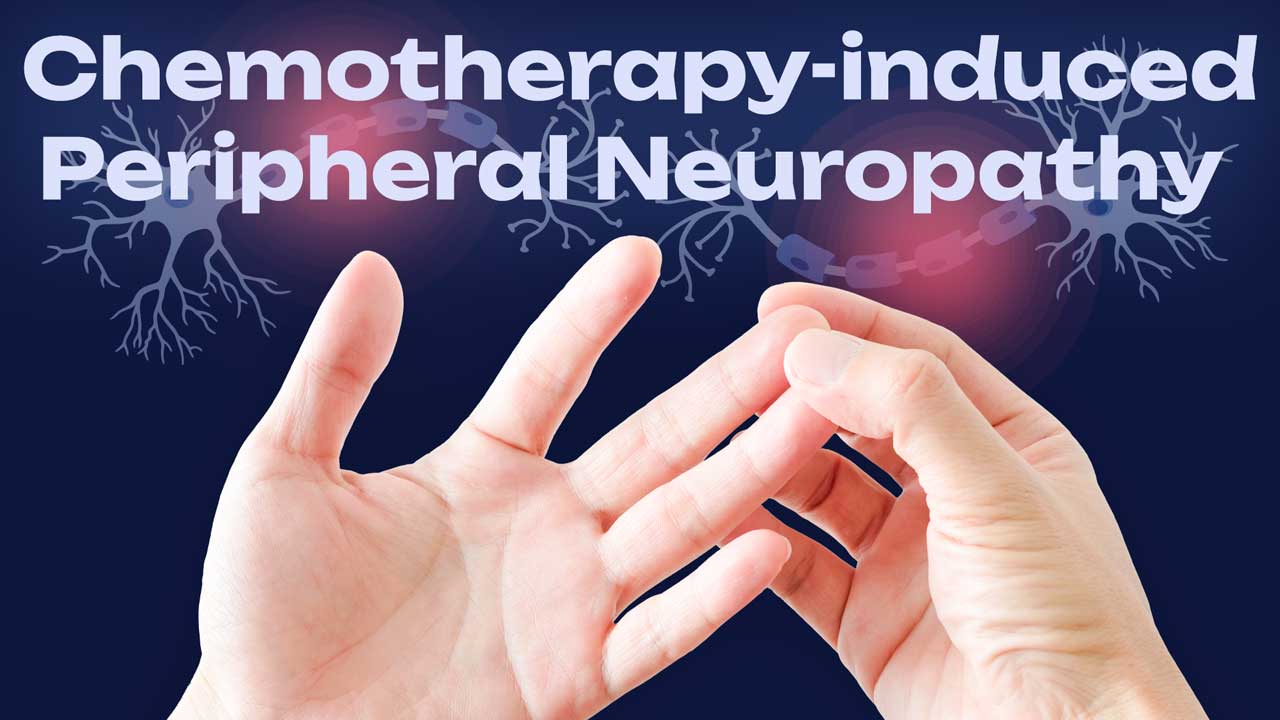Chemotherapy-induced peripheral neuropathy (CIPN) is a common side effect of certain chemotherapy agents resulting in damage to peripheral nerves - nerves located away from the centre of the body, including sensory nerves, motor nerves and the autonomic nervous system (Loprinzi 2023; Cancer Council Australia 2020).
This damage causes issues with sensory, motor and/or autonomic functioning ranging from mild to severe, depending on which nerves have been damaged (Zajączkowska et al. 2019; Cancer Council Australia 2020).
What Causes Chemotherapy-induced Peripheral Neuropathy?
Chemotherapy works by destroying fast-growing cells, which include cancer cells. However, other normal cells may also be damaged in this process. If nerve cells are badly damaged, they cannot be repaired or replaced easily, resulting in neuropathic issues (Zajączkowska et al. 2019; Cancer Council Australia 2020).
Certain chemotherapy agents have about a 70% chance of causing CIPN one month after treatment, and about 30% of these people will still experience symptoms six months after treatment. These agents include:
- Taxanes (e.g. docetaxel, paclitaxel)
- Platinum drugs (e.g. carboplatin, cisplatin, oxaliplatin)
- Vinca alkaloids (e.g. vincristine).
(Cancer Council Australia 2020)
Non-chemotherapy cancer-related causes of peripheral neuropathy may include:
- Other cancer medicines (e.g. thalidomide, bortezomib, brentuximab vedotin)
- Certain types of cancer, particularly lung cancer, myeloma and lymphoma
- Tumours pressing on nerves
- Bones breaking down and swelling, putting pressure on nerves
- Surgery or radiation therapy that damages nerves
- Other factors that might increase the risk of peripheral neuropathy after a cancer diagnosis (e.g. diabetes, shingles, excessive alcohol or drug use, lack of vitamins and minerals, smoking).
(Cancer Council Australia 2020)
Symptoms of Chemotherapy-induced Peripheral Neuropathy

CIPN may affect any part of the peripheral nervous system, including sensory nerves, motor nerves or the autonomic nervous system. Therefore, symptoms can vary greatly and may include:
| Sensory nerve symptoms |
|
| Motor nerve symptoms |
|
| Autonomic nervous system |
|
(Cancer Council Australia 2020)
The sensory nerves are most likely to be affected first, with symptoms predominantly involving the hands and feet (Zajączkowska et al. 2019).
Symptoms are typically mild upon onset but may eventually become more severe and disabling in some people (Cancer Australia Council 2020; ACS 2019).
Duration of Symptoms
The duration of symptoms depends on the type of chemotherapy used. Sometimes symptoms are acute, lasting for only a few days during or shortly after a chemotherapy session. In more severe cases, however, CIPN can worsen over time, even once treatment has concluded. In some cases, particularly if the chemotherapy was intensive, symptoms might be permanent or require years of recovery. It’s also possible for symptoms to commence months or years after undergoing treatment (Cancer Council Australia 2020; Cancer Institute NSW 2023).
In most cases, patients will recover in a few months (Cancer Institute NSW 2023).
Diagnosing Chemotherapy-induced Peripheral Neuropathy
Patients receiving chemotherapy agents that are associated with CIPN will be monitored for early signs and symptoms. If CIPN is suspected, the patient may need to complete a symptom checklist and undergo testing for spatial awareness, reflexes, balance and coordination, and blood pressure (Cancer Council Australia 2020).
Some patients might be referred to a neurologist to undergo nerve conduction studies, which test how many cells are functioning and how quickly they send electrical signals (Cancer Australia Council 2020).
Impacts on the Patient

CIPN may cause a variety of disturbances to daily activities and interfere with quality of life. Patients might experience:
- Discomfort and pain
- Difficulty performing day-to-day tasks that require motor control
- Increased risk of cuts and scalds due to numbness - these are also at greater risk of becoming infected because chemotherapy suppresses the immune system
- Increased risk of not noticing injuries, which may then worsen
- Difficulty walking
- Increased risk of falls
- Impaired sleep due to pain
- Inability to drive
- Difficulting returning to work or engaging in other activities
- Feeling isolated due to having difficulty moving around
- Feelings of lost independence.
(Cancer Council Australia 2020)
Complications of Chemotherapy-induced Peripheral Neuropathy
In severe cases, CIPN may lead to:
- Changes in heart rate and blood pressure
- Injury due to falls
- Breathing difficulties
- Paralysis
- Organ failure
- Impaired oncologic outcomes from modifying chemotherapy doses or prematurely discontinuing treatment due to CIPN.
(ACS 2019; Loprinzi 2023)
Treating Chemotherapy-induced Peripheral Neuropathy
The only known way to treat CIPN is to reduce the dose or frequency of chemotherapy or in severe cases, halt chemotherapy altogether (Cancer Council Australia 2020).
This could, however, have adverse oncologic outcomes (Loprinzi 2023).
In terms of symptom management, analgesics can be used but may prove ineffective. Stronger medicines like tramadol may be prescribed, but can have undesirable side effects and are not ideal as a long-term solution. Certain antidepressants, anticonvulsants and creams may be helpful, but there is limited evidence of their efficacy (Cancer Council Australia 2020).
Other symptom management techniques include:
- Laxatives or stool softeners to help manage constipation
- Exercise
- Aids and equipment (e.g. certain shoes)
- Using visual cues when walking over uneven ground
- Foot care
- Pain relief through massage, relaxation techniques, acupuncture, etc.
- Psychology and counselling.
(Cancer Council Australia 2020)
CIPN cannot be prevented (Cancer Council Australia 2020).
Caring for Patients With Chemotherapy-induced Peripheral Neuropathy

Patients experiencing CIPN may require additional help with daily tasks due to their symptoms. When caring for someone with CIPN:
- If assisting with bathing, check the water temperature to make sure it’s safe
- Ensure the patient’s hands and feet are kept warm
- Regularly check the patient’s hands and feet for cuts or injuries, and treat them promptly to prevent infection
- Provide hand and foot care (moisturise and keep their nails trimmed)
- Ensure the patient’s shoes fit well
- Encourage physical activity
- Encourage adequate intake of fluids, fruits, vegetables and fibre-rich foods in order to reduce constipation
- Consider providing support stockings for the patient to wear during the day in order to improve circulation
- Ensure hallways and rooms are well-lit
- Remove any clutter or tripping hazards
- Clean up spills/wet floors immediately
- Implement non-slip mats in the shower and bath
- Implement rails on stairs and in bathrooms.
(Cancer Council Australia 2020; Cancer Institute NSW 2023)
Test Your Knowledge
Question 1 of 3
True or false: Chemotherapy-induced peripheral neuropathy can be prevented.
Topics
References
- American Cancer Society 2019, What Is Peripheral Neuropathy?, ACS, viewed 19 February 2024, https://www.cancer.org/treatment/treatments-and-side-effects/physical-side-effects/peripheral-neuropathy/what-is-peripherial-neuropathy.html
- Cancer Council Australia 2020, Understanding Peripheral Neuropathy and Cancer, Cancer Council Australia, viewed 19 February 2024, https://www.cancercouncil.com.au/wp-content/uploads/2020/04/Understanding-Peripheral-Neuropathy-2020-1.pdf
- Cancer Institute NSW 2023, Peripheral Neuropathy During Cancer Treatment, New South Wales Government, viewed 19 February 2024, https://www.eviq.org.au/getmedia/8a1179eb-3d56-44a1-9be8-4925e0d84023/ID-536-Peripheral-neuropathy-during-cancer-treatment-V6.pdf.aspx?ext=.pdf
- Loprinzi, CL 2023, Prevention and Treatment of Chemotherapy-Induced Peripheral Neuropathy, UpToDate, viewed 19 February 2024, https://www.uptodate.com/contents/prevention-and-treatment-of-chemotherapy-induced-peripheral-neuropathy
- Zajączkowska, R, Kocot-Kępska, M, Leppert, W, Wrzosek, A, Mika, J & Wordliczek, J 2019, ‘Mechanisms of Chemotherapy-Induced Peripheral Neuropathy’, Int J Mol Sci., vol. 20, no. 6, viewed 19 February 2024, https://www.ncbi.nlm.nih.gov/pmc/articles/PMC6471666/
 New
New 
